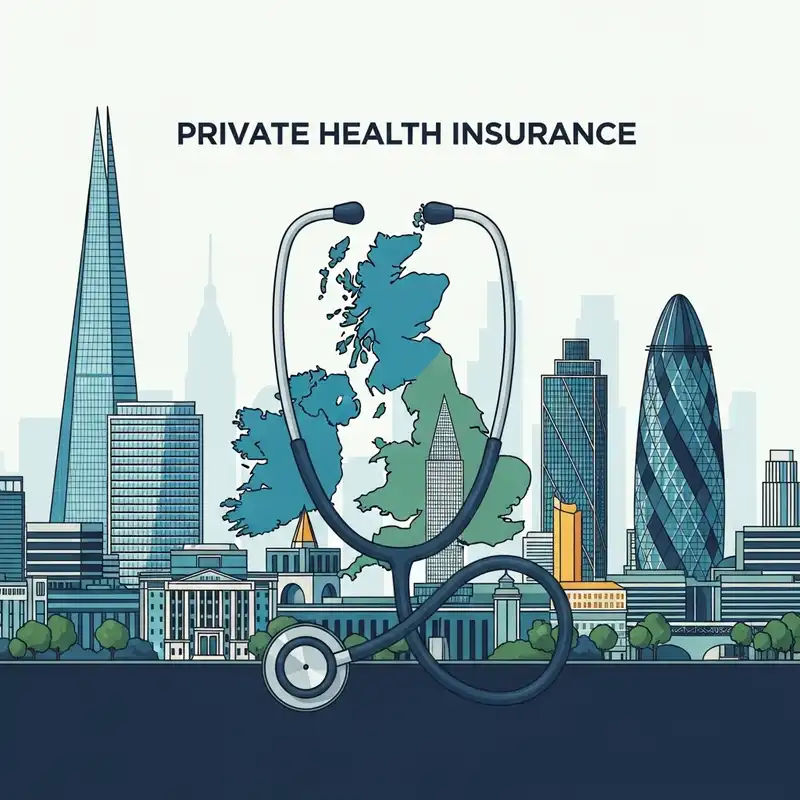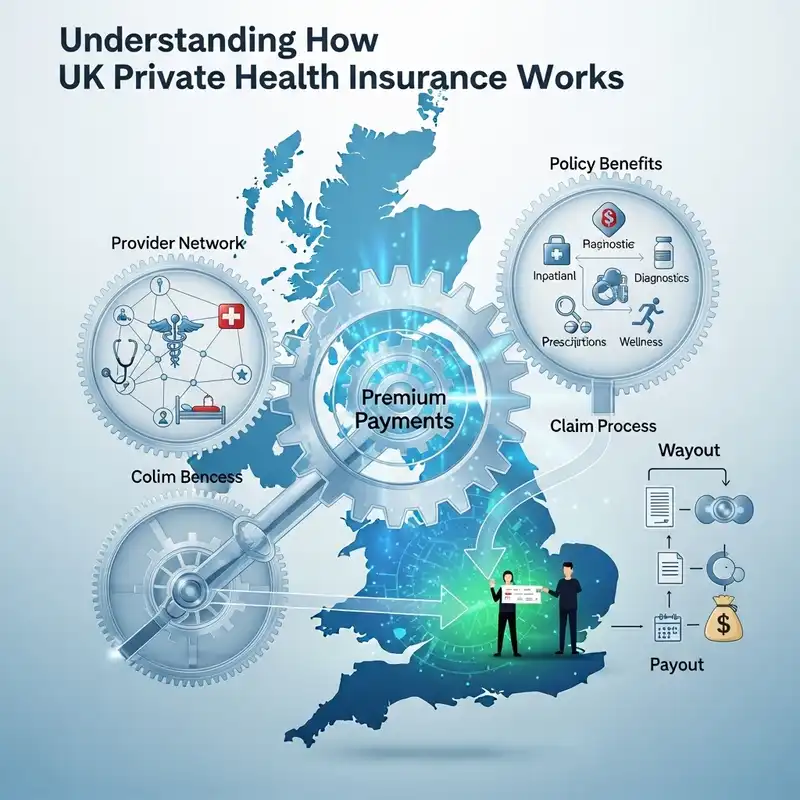Beyond Physical Ailments How Private Health Insurance Reduces the Cognitive Load of Managing Your Health in the UK

Beyond Physical Ailments: How Private Health Insurance Reduces the Cognitive Load of Managing Your Health in the UK
In the bustling rhythm of modern life, our minds are constantly at work, processing information, making decisions, and managing an endless list of tasks. This mental exertion, often referred to as 'cognitive load', is a finite resource. While we readily acknowledge the physical toll of a demanding job or an active lifestyle, the invisible burden of managing our health – particularly within a complex healthcare system – is often overlooked. In the UK, with its treasured but increasingly stretched National Health Service (NHS), this cognitive load can become substantial, silently eroding our peace of mind and mental energy.
This extensive guide will delve deep into how private health insurance (PHI) offers far more than just rapid access to medical treatment. It acts as a powerful tool for alleviating the significant cognitive load associated with navigating healthcare in the UK, freeing up mental space for what truly matters in your life.
The NHS and the Unseen Cognitive Toll
The NHS is a cornerstone of British society, providing universal healthcare free at the point of use. Its dedicated staff work tirelessly, and for many acute emergencies and routine care, it remains indispensable. However, the NHS is under immense pressure, leading to challenges that, while not immediately life-threatening, can impose a profound cognitive burden on individuals and families.
Consider these common scenarios that contribute to cognitive overload:
- Waiting Lists: Whether for a GP appointment, a specialist referral, diagnostic scans (like MRI or CT), or elective surgery, waiting times can stretch for weeks or even months. This period of uncertainty is rife with anxiety. Will the condition worsen? How long will I be in pain? Can I plan my life around this?
- Navigating Referrals: Understanding the correct pathway for a specific condition, getting the necessary referrals, and chasing appointments can be a labyrinthine process. Patients often feel like they are solely responsible for coordinating their care.
- Limited Choice: With the NHS, you generally don't get to choose your consultant or hospital. While the quality of care is high, the lack of control can add to a feeling of powerlessness and reduce trust if a particular specialist is desired.
- Information Asymmetry: Understanding medical jargon, treatment options, and prognoses can be overwhelming. Patients often leave appointments feeling confused or with unanswered questions, leading to endless online research and increased worry.
- Administrative Burden: From repeated phone calls to secure an appointment, to tracking down test results, or clarifying conflicting information, the sheer administrative effort involved can be exhausting.
- The Unknown: The greatest cognitive strain often comes from the unknown – the worry about an undiagnosed symptom, the anxiety of awaiting test results, or the fear of a condition progressing while waiting for treatment.
These pressures don't just lead to physical discomfort; they lead to:
- Decision Fatigue: Having to constantly weigh options, even if they're limited, and chase up different departments.
- Anxiety and Stress: The constant background hum of worry about health, especially when facing delays.
- Mental Exhaustion: The sheer effort of managing health concerns on top of daily responsibilities.
- Reduced Productivity: Mental preoccupation with health issues can spill over into work and personal life, affecting focus and output.
This is where private health insurance steps in, not as a replacement for the NHS, but as a complementary service designed to alleviate this unseen cognitive toll.
How Private Health Insurance Steps In: A Cognitive Relief Toolkit
Private health insurance is more than just a financial safety net; it's a proactive measure against cognitive overload. It offers a suite of benefits that directly address the pain points of the UK healthcare system, reducing the mental burden on individuals.
1. Rapid Access & Reduced Waiting Times: Reclaiming Your Time and Peace of Mind
One of the most immediate and profound benefits of PHI is significantly reduced waiting times. When you have a health concern, the ability to get a quick diagnosis and prompt treatment is invaluable.
- Swift GP Appointments: Many policies offer access to private GPs, often with same-day or next-day virtual or in-person appointments. This eliminates the stress of waiting days or weeks for a limited NHS slot.
- Expedited Specialist Referrals: Once a concern is identified, PHI allows for rapid referral to a specialist consultant. Instead of weeks or months on an NHS waiting list, you could see a consultant within days.
- Quick Diagnostic Tests: Need an MRI, CT scan, or specialist blood test? PHI provides access to private facilities where appointments are typically available much faster.
- Prompt Treatment: Should surgery or a specific therapy be required, PHI ensures you can receive it without undue delay, often at a time that suits you.
Cognitive Benefit: The mental relief derived from rapid access cannot be overstated. It eliminates the gnawing anxiety of waiting, reduces the potential for a condition to worsen, and allows you to move from uncertainty to action swiftly. Your mind is less preoccupied with "what if" scenarios and more focused on recovery and getting back to normal. You spend less time worrying and more time living.
- Real-life Example: Sarah develops a persistent, worrying cough. Instead of waiting two weeks for an NHS GP appointment, her private health insurance allows her to book a virtual GP consultation for the same afternoon. The GP refers her for a chest X-ray, which she has done privately the next day. Within 48 hours, she has a diagnosis (a non-serious chest infection), a prescription, and peace of mind, avoiding weeks of escalating worry and discomfort.
2. Choice and Control: Empowering Your Health Journey
A key differentiator of PHI is the level of choice and control it affords you over your medical journey.
- Choose Your Consultant: You can select a consultant based on their expertise, reputation, or even specific sub-specialism. This fosters a greater sense of trust and confidence in your care.
- Choose Your Hospital: Policies often provide access to a network of private hospitals, allowing you to pick a location that's convenient, or one known for particular facilities or patient experience.
- Flexible Appointments: You can often schedule appointments at times that fit your work and personal life, reducing disruption and stress.
- Second Opinions: Many policies facilitate obtaining a second medical opinion, offering reassurance and peace of mind, or potentially exploring alternative treatment paths.
Cognitive Benefit: This element of choice reduces feelings of helplessness and increases your sense of empowerment. You're not just a passive recipient of care; you're an active participant in your health decisions. This reduces the cognitive load associated with 'making do' or feeling trapped by limited options. It builds confidence and reduces the mental burden of uncertainty.
- Real-life Example: John needs knee surgery. With his private health insurance, he researches orthopaedic surgeons specialising in his specific type of knee injury. He chooses a highly recommended consultant and a private hospital with excellent post-operative care facilities, rather than accepting the next available slot on the NHS list. This control significantly reduces his pre-surgery anxiety.
3. Streamlined Pathways & Dedicated Support: A Navigator for Your Health
Navigating healthcare can feel like a full-time job. Private health insurance providers often simplify this process considerably.
- Dedicated Support Teams: Many insurers offer direct lines to claims teams or health helplines who can guide you through the process, from finding a specialist to understanding your benefits.
- Simplified Referrals: Within the private system, the referral process from GP to specialist to diagnostics is often much more straightforward and quicker.
- Case Management: For complex conditions, some policies offer case management services, where a dedicated nurse or health professional helps coordinate your care.
- Digital Tools: Access to online portals, apps, and virtual consultations further streamlines the process, reducing the need for phone calls and paperwork.
Cognitive Benefit: This removes a huge administrative and navigational burden. You don't have to spend mental energy researching pathways, calling multiple departments, or untangling bureaucracy. Someone else is often there to guide you, reducing decision fatigue and the feeling of being overwhelmed. It transforms a potentially confusing journey into a clear, guided path.
- Real-life Example: Maria receives a referral for a potential gynaecological issue. Instead of researching specialists and trying to find appointment availability, her insurer's helpline provides her with a list of approved consultants in her area, along with their availability. The claims team then pre-authorises the initial consultation, removing any financial worry and administrative hassle, allowing Maria to focus solely on her health.
4. Proactive Health Management & Prevention: Shifting from Reactive to Proactive
Many modern private health insurance policies extend beyond just covering acute illness. They increasingly incorporate benefits aimed at proactive health management and prevention.
- Annual Health Assessments: Comprehensive check-ups can identify potential issues early, often before symptoms arise.
- Virtual GP Services: Easy access to GPs for minor ailments, prescriptions, or advice, preventing small issues from escalating.
- Mental Health Support Lines: Confidential access to mental health professionals for early intervention.
- Physiotherapy & Chiropractic Cover: Access to therapies often without a prior GP referral, for musculoskeletal issues.
- Wellness Programmes & Discounts: Access to gym memberships, health apps, and other wellness initiatives.
Cognitive Benefit: This proactive approach reduces the cognitive load of "what if?" scenarios. By focusing on prevention and early detection, you reduce the likelihood of major health crises, which are significant sources of cognitive stress. It empowers you to take charge of your well-being, fostering a sense of control and reducing future health-related anxiety. You're not just waiting for something to go wrong; you're actively working to stay well.
- Real-life Example: David, concerned about his increasing stress levels, utilises his policy's mental health helpline. He's connected with a counsellor quickly, who helps him develop coping strategies. This early intervention prevents his stress from spiralling into a more serious condition, saving him immense cognitive distress and potential time off work.
5. Financial Certainty & Reduced Stress over Costs: The Unseen Financial Load
While the NHS is free at the point of use, private healthcare can be expensive. The worry about potential medical bills can be a huge source of cognitive load.
- Covered Costs: Private health insurance covers eligible costs of private medical treatment, from consultations and diagnostic tests to hospital stays and surgery.
- Budgeting Peace of Mind: Knowing that significant medical expenses are covered provides immense financial security and removes a major source of anxiety.
- Focus on Recovery: When you don't have to worry about how to pay for treatment, you can focus all your mental energy on recovery and getting well.
Cognitive Benefit: This benefit directly removes a monumental source of stress and decision-making. You're not weighing up your health against your savings, or worrying about debt. The mental space consumed by financial anxieties related to health is freed up. It allows for a clear-headed approach to health decisions, purely based on medical need, not financial constraint.
Crucial Caveat: It's vital to understand that private health insurance is designed to cover acute conditions – those that are short-term, curable, and generally respond to treatment. It does not typically cover:
- Pre-existing Conditions: Conditions you had symptoms of, or were diagnosed with, before taking out the policy.
- Chronic Conditions: Long-term, incurable conditions that require ongoing management (e.g., diabetes, asthma, epilepsy). While some policies might cover acute flare-ups or diagnostics related to chronic conditions, the ongoing management and medication are generally excluded.
- Emergency Care: For genuine emergencies, the NHS A&E department is always the first port of call.
Always ensure you fully understand what your specific policy does and does not cover to avoid any future surprises and associated cognitive distress.
- Real-life Example: Eleanor requires a minor surgical procedure. Without private health insurance, she'd be calculating how much the consultations, tests, and operation would cost, potentially delaying treatment due to financial apprehension. With her policy, she simply focuses on her recovery, knowing all eligible costs are taken care of.
6. Mental Health Support: Addressing the Root of Cognitive Strain
The link between physical and mental health is undeniable. Many modern private health insurance policies now include robust mental health benefits.
- Direct Access to Therapists: No long waiting lists for counselling or psychotherapy.
- Psychiatric Consultations: Access to psychiatrists for diagnosis and medication management.
- Inpatient and Outpatient Care: Coverage for a range of mental health services, from talking therapies to more intensive inpatient treatment if needed.
- Online Resources: Many insurers provide access to mental well-being apps, mindfulness exercises, and helplines.
Cognitive Benefit: Mental health issues themselves impose a massive cognitive load – from anxiety and rumination to depression and decision-making difficulties. By providing swift, confidential access to professional support, private health insurance directly alleviates this burden. It allows individuals to address underlying stress, anxiety, or depression that might be compounding physical health worries, leading to a profound reduction in overall cognitive strain. Early intervention can prevent minor concerns from escalating into debilitating conditions.
- Real-life Example: Mark finds himself struggling with anxiety after a period of high stress at work. His PHI allows him to access an initial assessment with a mental health professional within days, leading to a course of cognitive behavioural therapy (CBT). This quick, private intervention helps him regain control over his thoughts and reduces the constant mental churn that was affecting his daily life.
The Nuances: Understanding Policy Specifics and Limitations
While the benefits are clear, understanding the specifics of private health insurance is crucial to ensure it truly reduces your cognitive load and doesn't inadvertently create new worries.
Pre-existing Conditions: The Golden Rule
As mentioned, this is paramount. A pre-existing condition is generally defined as any illness, injury, or disease for which you have received medication, advice, or treatment, or had symptoms of, at any time before your policy starts. Insurers generally exclude these from coverage.
- Why? Insurance is based on unforeseen events. If you already have a condition, it's a known risk.
- Cognitive Impact: If you have a pre-existing condition and expect it to be covered, you'll experience significant cognitive distress when your claim is denied. Be absolutely clear about this limitation from the outset.
Chronic Conditions: Ongoing Management
Chronic conditions are long-term, persistent, or recurring illnesses that generally require ongoing management and are not curable. Examples include diabetes, asthma, hypertension, epilepsy, multiple sclerosis, and most mental health conditions that are lifelong.
- Why excluded? The ongoing, potentially lifelong costs of managing chronic conditions are generally beyond the scope of acute medical insurance.
- What might be covered? Some policies may cover acute flare-ups of a chronic condition (e.g., an asthma attack requiring hospitalisation), or diagnostic tests related to a chronic condition, but not the long-term management or medication.
- Cognitive Impact: Again, understanding this is key. Don't expect PHI to cover your regular diabetic medication or ongoing therapy for a lifelong mental health condition.
Acute Conditions: What PHI Does Cover
PHI excels at covering acute conditions – those that are sudden in onset, short-term, and curable. This could be anything from:
- A broken bone
- A hernia
- Gallstones
- Tonsillitis
- Most cancers (if diagnosed after the policy starts and not pre-existing)
- Cataracts
- Non-chronic back pain
Underwriting Methods: How Your Medical History Is Assessed
The way your medical history is assessed impacts what is covered and your initial cognitive load.
-
Full Medical Underwriting (FMU):
- You declare your full medical history at the outset.
- The insurer reviews it and explicitly states any exclusions from the start.
- Cognitive Benefit: High certainty from day one. You know exactly what's covered and what's not, eliminating future surprises.
- Initial Cognitive Load: More upfront effort in providing detailed medical history.
-
Moratorium Underwriting:
- You don't need to declare your full medical history initially.
- Pre-existing conditions are automatically excluded for a set period (typically 24 months).
- If you have no symptoms or treatment for a pre-existing condition during this moratorium period, it may then become covered.
- Cognitive Benefit: Lower initial administrative burden.
- Potential Future Cognitive Load: Uncertainty about what might become covered later. If you make a claim within the moratorium period, the insurer will investigate your past medical history to determine if it's a pre-existing condition. This investigation itself can be a source of stress.
Choosing the right underwriting method depends on your comfort with upfront disclosure versus potential future uncertainty.
Excesses and Co-payments: Understanding Your Contribution
- Excess: An amount you agree to pay towards the cost of your treatment before the insurer pays out. A higher excess usually means a lower premium.
- Co-payment: Some policies require you to pay a percentage of the treatment cost.
Cognitive Impact: Be clear about these. Misunderstanding your financial contribution can lead to unexpected bills and significant cognitive distress when a claim arises. Factor these into your budgeting and decision-making process.
Policy Tiers and Benefits: Tailoring Your Cover
PHI policies come in various tiers, affecting the level of cover and access to services:
- Inpatient Only: Covers treatment requiring an overnight stay in hospital.
- Inpatient & Outpatient: Includes consultations, diagnostic tests, and physiotherapy as an outpatient. This is usually more comprehensive.
- Hospital Network: Different policies offer access to different hospital lists (e.g., a "full" list of all private hospitals, or a more restricted "budget" list).
- Added Benefits: Access to virtual GPs, mental health support, health assessments, international cover, etc., vary significantly by policy.
Cognitive Impact: Understanding the scope of your policy prevents disappointment and frustration. If you expect outpatient consultations but only have inpatient cover, that's a source of future cognitive distress. Tailor your policy to your perceived needs to ensure maximum peace of mind.
Real-World Scenarios: Cognitive Load Reduction in Action
Let's illustrate how PHI directly reduces cognitive load with some hypothetical, yet common, situations:
-
Scenario 1: The Nagging Symptom (Persistent Headaches)
- NHS Path: Call GP, wait 1-2 weeks for appointment. GP refers to neurologist, wait 3-6 months. Neurologist recommends MRI, wait 1-2 months. Total time: 5-9 months of constant worry, "what-ifs", and managing pain. High cognitive load.
- PHI Path: Virtual GP within hours. Immediate referral to a private neurologist within days. MRI scheduled for next week. Diagnosis and treatment plan within 2-3 weeks. Cognitive load: Minimal, as concerns are addressed swiftly, providing peace of mind.
-
Scenario 2: The Unexpected Injury (Sports-Related Knee Pain)
- NHS Path: GP appointment, wait for physiotherapy referral (weeks). If physiotherapy isn't enough, wait for orthopaedic referral (months). Potential for prolonged pain, reduced mobility, and inability to participate in activities. High cognitive load from managing pain, uncertainty, and disruption to life.
- PHI Path: Private GP or direct access to physiotherapist within days. Rapid diagnostic imaging (MRI) if needed. Orthopaedic consultation within a week if severe. Quicker treatment and rehabilitation. Cognitive load: Focus on recovery, not managing delays and pain. Quicker return to normal activities.
-
Scenario 3: Mental Health Wobble (Rising Anxiety)
- NHS Path: GP appointment, self-referral to IAPT (Improving Access to Psychological Therapies), wait 6-12 weeks for initial assessment, then further wait for therapy sessions. Meanwhile, anxiety escalates, impacting work and personal life. Very high cognitive load from feeling overwhelmed and unsupported.
- PHI Path: Access to a mental health helpline or virtual GP within hours/days. Rapid referral to a private counsellor or psychologist, often within a week. Regular sessions begin promptly. Cognitive load: Immediate support and proactive management reduce mental distress before it becomes debilitating.
-
Scenario 4: The Need for a Second Opinion (Complex Diagnosis)
- NHS Path: Difficult and time-consuming to arrange, often requiring GP support or even seeking opinions abroad. High cognitive load from uncertainty and feeling unsupported in exploring all options.
- PHI Path: Often a straightforward process to seek an independent second opinion from another leading specialist, reducing doubt and confirming treatment paths. Cognitive load: Reassurance and confidence in chosen treatment, reducing rumination and anxiety.
Choosing the Right Policy: Reducing the Initial Cognitive Burden
The private health insurance market in the UK is diverse, with numerous insurers offering a wide array of policies. Navigating this landscape can itself be a source of cognitive load.
- Market Complexity: Each insurer has different terms, benefits, exclusions, hospital networks, and pricing structures.
- Understanding Your Needs: Deciphering what level of cover you truly need (e.g., basic inpatient, comprehensive outpatient, mental health, cancer care) can be daunting.
- Budget vs. Benefit: Balancing desired benefits with affordability requires careful consideration.
This is where expert, impartial advice becomes invaluable.
This is where we at WeCovr come in. As a modern UK health insurance broker, we specialise in cutting through the complexity. Our mission is to empower you to make informed decisions without the typical headache.
- Comprehensive Market Comparison: We work with all major UK health insurance providers, allowing us to compare policies and find the best fit for your specific needs, circumstances, and budget. You don't have to spend hours researching different companies.
- Expert Guidance: We explain the nuances of policies, including underwriting methods, excesses, and crucial exclusions (like pre-existing and chronic conditions), ensuring you fully understand what you're buying.
- Tailored Recommendations: We take the time to understand your priorities, whether that's rapid access, specific mental health benefits, or a particular hospital network, and then present options that align perfectly.
- Cost-Free Service: Crucially, our service comes at no cost to you. We are remunerated by the insurers, meaning our focus is solely on finding you the best value and coverage. We work for you, not the insurers, ensuring you get unbiased advice.
By using a broker like WeCovr, you significantly reduce the initial cognitive load of selecting private health insurance, transforming a potentially overwhelming decision into a smooth, informed choice.
Beyond the Individual: Cognitive Load Reduction for Families and Businesses
The benefits of private health insurance in reducing cognitive load extend far beyond the individual policyholder, impacting families and businesses alike.
For Families
-
Parental Peace of Mind: For parents, knowing that children can access rapid diagnosis and treatment for acute illnesses, without long NHS waits, offers immense peace of mind. This reduces the cognitive burden of worrying about a sick child and the disruption to family life.
-
Reduced Disruption: Quicker appointments and treatment for any family member mean less time spent off work or school for appointments, and quicker recovery, minimising disruption to daily routines.
-
Holistic Family Well-being: Access to mental health support or wellness programmes benefits the entire family unit, reducing overall stress and fostering a healthier home environment.
-
Real-life Example: A child wakes up with a persistent rash. The parents, concerned, use their family health insurance to book a private paediatric GP appointment that afternoon. The rapid diagnosis and treatment mean the child is comfortable sooner, and the parents avoid days of anxiety and juggling school/work around NHS waiting times.
For Businesses (SME/Corporate PHI)
Forward-thinking businesses increasingly recognise the value of offering private health insurance to their employees, and the benefits often translate into significant cognitive load reduction for both employees and the management team.
-
Reduced Absenteeism & Presenteeism: Quicker access to medical care means employees return to work faster, reducing the cognitive load on colleagues covering their duties and on management dealing with staff shortages. It also tackles 'presenteeism' (being at work but unproductive due to ill health), which is a huge drain on cognitive resources.
-
Improved Employee Morale & Reduced Stress: Knowing they have access to swift, high-quality healthcare significantly reduces health-related stress for employees, leading to higher morale and reduced mental preoccupation with health concerns. This frees up their cognitive bandwidth for their work.
-
Attraction and Retention of Talent: Offering comprehensive health benefits enhances a company's attractiveness as an employer, reducing the cognitive load associated with recruitment and retention challenges.
-
Reduced Management Burden: HR and management teams spend less time dealing with long-term sickness absence or employee health issues that drag on due to NHS waiting times. The private system handles more of the administrative burden.
-
Proactive Workforce Health: Wellness programmes and mental health support included in corporate policies help maintain a healthier, more resilient workforce, reducing future health-related cognitive burdens for everyone.
-
Real-life Example: A key employee develops a musculoskeletal issue that impacts their ability to perform their job effectively. With company health insurance, they get rapid access to diagnostics and physiotherapy, returning to full productivity much faster than they would have via NHS pathways. This not only benefits the employee's well-being but also alleviates the cognitive pressure on their manager to find cover or manage reduced output.
Investing in Peace of Mind: The Intangible Benefits of Private Health Insurance
While the tangible benefits of private health insurance – quicker access, choice, and financial certainty – are significant, its most profound contribution often lies in the intangible. It is an investment in your peace of mind and, by extension, your overall well-being.
By systematically addressing the sources of cognitive load related to health management, private health insurance allows you to:
- Reclaim Mental Bandwidth: Free up mental energy previously consumed by worry, waiting, and navigating complex systems.
- Reduce Anxiety and Stress: Less uncertainty and more control over your health journey lead to a calmer, more centred state of mind.
- Improve Focus and Productivity: With fewer health-related distractions, you can dedicate more cognitive resources to your work, hobbies, and relationships.
- Live More Fully: The ability to address health concerns quickly and confidently means you spend less time preoccupied with illness and more time engaging with life.
- Build Resilience: Knowing you have a safety net for health concerns contributes to a greater sense of security and resilience in the face of life's unpredictable challenges.
It's about shifting from a reactive, anxious approach to health management to a proactive, confident, and empowered stance. This isn't merely about treating illness; it's about safeguarding your mental well-being and enhancing your capacity to thrive.
Conclusion: Reclaiming Your Cognitive Space
In an increasingly demanding world, our cognitive resources are precious. The unseen burden of managing our health within a stretched healthcare system can drain these resources, leading to stress, anxiety, and mental exhaustion.
Private health insurance offers a powerful solution by directly addressing the root causes of this cognitive load. From rapid access and greater choice to streamlined processes and vital mental health support, it provides a structured framework that minimises uncertainty, reduces administrative burden, and empowers you to take control of your health journey. While it complements rather than replaces the NHS, its ability to provide prompt, tailored care for acute conditions offers unparalleled peace of mind.
By investing in private health insurance, you're not just buying access to medical treatment; you're investing in your mental clarity, your reduced stress levels, and your overall capacity to live a full and unburdened life. It's about reclaiming your cognitive space and ensuring that when health concerns arise, your focus can remain on getting well, not on navigating a complex and worrying system.
Consider exploring how private health insurance could benefit you and your family. For impartial advice and to compare policies from all major UK insurers at no cost, reach out to experts who can guide you through the options.
Frequently Asked Questions (FAQs)
Q1: Is private health insurance expensive?
The cost of private health insurance varies widely depending on factors such as your age, location, the level of cover you choose (e.g., inpatient only vs. comprehensive outpatient), the size of your excess, and your medical history. While it is an investment, the value it provides in terms of peace of mind, rapid access, and reduced cognitive load can be significant. Using a broker like WeCovr can help you find the most cost-effective policy that meets your specific needs by comparing options from all major providers.
Q2: Can I still use the NHS if I have private health insurance?
Absolutely. Private health insurance is designed to complement the NHS, not replace it. For emergencies, the NHS A&E is always the first port of call. Many people choose to use the NHS for routine GP appointments or chronic condition management, while using their private health insurance for specialist consultations, diagnostics, and acute treatment, or for quicker access to specific therapies.
Q3: Will private health insurance cover my ongoing medication?
Generally, no. Private health insurance primarily covers acute conditions – those that are short-term, curable, and respond to treatment. It does not typically cover long-term or ongoing medication for chronic conditions (e.g., daily insulin for diabetes, or ongoing prescriptions for high blood pressure). Always check the specific terms and conditions of your policy.
Q4: What about mental health coverage?
Many modern private health insurance policies now include mental health benefits, recognising the critical link between mental and physical well-being. The scope of coverage varies, from access to virtual mental health helplines and initial counselling sessions to more comprehensive coverage for psychotherapy, cognitive behavioural therapy (CBT), and even inpatient psychiatric care. It's important to review the mental health section of any policy carefully, as pre-existing chronic mental health conditions may still be excluded.
Q5: How do I choose the best policy for me?
Choosing the best policy involves understanding your personal and family health needs, your budget, and the complexities of different policy types, underwriting methods, and exclusions. It can be a daunting task. The most effective way is to seek impartial advice from a specialist health insurance broker, such as WeCovr. We can assess your requirements, explain the intricacies of different policies, compare options from leading UK insurers, and help you find a tailored solution that provides the best value and peace of mind, all at no cost to you.
Related guides
Why private medical insurance and how does it work?
What is Private Medical Insurance?
Private medical insurance (PMI) is a type of health insurance that provides access to private healthcare services in the UK. It covers the cost of private medical treatment, allowing you to bypass NHS waiting lists and receive faster, more convenient care.How does it work?
Private medical insurance works by paying for your private healthcare costs. When you need treatment, you can choose to go private and your insurance will cover the costs, subject to your policy terms and conditions. This can include:• Private consultations with specialists
• Private hospital treatment and surgery
• Diagnostic tests and scans
• Physiotherapy and rehabilitation
• Mental health treatment
Your premium depends on factors like your age, health, occupation, and the level of cover you choose. Most policies offer different levels of cover, from basic to comprehensive, allowing you to tailor the policy to your needs and budget.
Questions to ask yourself regarding private medical insurance
Just ask yourself:👉 Are you concerned about NHS waiting times for treatment?
👉 Would you prefer to choose your own consultant and hospital?
👉 Do you want faster access to diagnostic tests and scans?
👉 Would you like private hospital accommodation and better food?
👉 Do you want to avoid the stress of NHS waiting lists?
Many people don't realise that private medical insurance is more affordable than they think, especially when you consider the value of faster treatment and better facilities. A great insurance policy can provide peace of mind and ensure you receive the care you need when you need it.
Benefits offered by private medical insurance
Private medical insurance provides numerous benefits that can significantly improve your healthcare experience and outcomes:Faster Access to Treatment
One of the biggest advantages is avoiding NHS waiting lists. While the NHS provides excellent care, waiting times can be lengthy. With private medical insurance, you can often receive treatment within days or weeks rather than months.
Choice of Consultant and Hospital
You can choose your preferred consultant and hospital, giving you more control over your healthcare journey. This is particularly important for complex treatments where you want a specific specialist.
Better Facilities and Accommodation
Private hospitals typically offer superior facilities, including private rooms, better food, and more comfortable surroundings. This can make your recovery more pleasant and potentially faster.
Advanced Treatments
Private medical insurance often covers treatments and medications not available on the NHS, giving you access to the latest medical advances and technologies.
Mental Health Support
Many policies include comprehensive mental health coverage, providing faster access to therapy and psychiatric care when needed.
Tax Benefits for Business Owners
If you're self-employed or a business owner, private medical insurance premiums can be tax-deductible, making it a cost-effective way to protect your health and your business.
Peace of Mind
Knowing you have access to private healthcare when you need it provides invaluable peace of mind, especially for those with ongoing health conditions or concerns about NHS capacity.
Private medical insurance is particularly valuable for those who want to take control of their healthcare journey and ensure they receive the best possible treatment when they need it most.
Important Fact!
We can look at a more suitable option mid-term!
Why is it important to get private medical insurance early?
👉 Many people are very thankful that they had their private medical insurance cover in place before running into some serious health issues. Private medical insurance is as important as life insurance for protecting your family's finances.👉 We insure our cars, houses, and even our phones! Yet our health is the most precious thing we have.
Easily one of the most important insurance purchases an individual or family can make in their lifetime, the decision to buy private medical insurance can be made much simpler with the help of FCA-authorised advisers. They are the specialists who do the searching and analysis helping people choose between various types of private medical insurance policies available in the market, including different levels of cover and policy types most suitable to the client's individual circumstances.
It certainly won't do any harm if you speak with one of our experienced insurance experts who are passionate about advising people on financial matters related to private medical insurance and are keen to provide you with a free consultation.
You can discuss with them in detail what affordable private medical insurance plan for the necessary peace of mind they would recommend! WeCovr works with some of the best advisers in the market.
By tapping the button below, you can book a free call with them in less than 30 seconds right now:
Our Group Is Proud To Have Issued 900,000+ Policies!
We've established collaboration agreements with leading insurance groups to create tailored coverage
























How It Works
1. Complete a brief form

2. Our experts analyse your information and find you best quotes

3. Enjoy your protection!

Any questions?
Learn more

Who Are WeCovr?
WeCovr is an insurance specialist for people valuing their peace of mind and a great service.👍 WeCovr will help you get your private medical insurance, life insurance, critical illness insurance and others in no time thanks to our wonderful super-friendly experts ready to assist you every step of the way.
Just a quick and simple form and an easy conversation with one of our experts and your valuable insurance policy is in place for that needed peace of mind!




